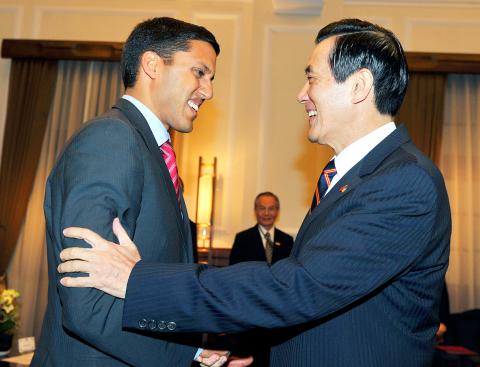More than half a century after the US phased out its economic assistance to Taiwan, the head of the US federal government aid agency yesterday encouraged Taiwan to become a provider of development assistance across the world.
United States Agency for International Development (USAID) Administrator Rajiv Shah singled out three areas in which the US and Taiwan could work together to help create a safe and prosperous world for all the people: humanitarian assistance, food security and health.
The US would like to engage in expanded and more effective cooperation with Taiwan in delivering humanitarian assistance, eliminating hunger and child malnutrition, and investing in healthcare to reduce infectious diseases.

Photo: CNA
Leading the efforts of more than 8,000 professionals in 80 missions around the world after he was sworn in two years ago, Shah was invited by the American Institute in Taiwan to deliver a speech at the “American Footprints in Taiwan” exhibition yesterday.
In his speech, he cited a number of cases of Taiwan’s transformation from a country receiving aid from the US to a partner with the US in development cooperation.
The assistance the US offered to Taiwan and South Korea in the Cold War cost less than 1 percent of its budget, but “have paid tremendous dividends,” he said.
“Our development cooperation [with Taiwan] has evolved. We no longer provide traditional development assistance to the country. Instead, we have an active conversation about how we might work together,” he said.
Shah referred to the situation in a refugee camp on the Kenya-Somalia border to highlight the importance of international cooperation in development.
“Designed 20 years ago for about 80,000 people, today, nearly half a million refugees live in this environment. The drought in the Horn of Africa affected more than 1.3 million people, who have experienced hunger and deprivation for the last four months. Most of the world barely notices that more than 30,000 children under the age of five have died of hunger or hunger-related diseases,” he said.
More than 960 million people worldwide go to bed hungry every night, Shah said, but he added that it would be possible to reduce this number to close to 200 million “if we double development investment with real policy reform.”
A problem that had to be addressed in policy reform was to examine domestic policies as well as international standards and norms for trade, so as to achieve development results, Shah said.
“Over the last 50 or 60 years, people who led development agencies had not necessarily done as much as they should to have a voice and have a seat at the table to discuss issues like global and bilateral trade negotiations,” he said.
US President Barack Obama’s administration has tried to correct that, “but we were open-eyed about how difficult the challenge is. The next trade and development round [of talks] will be conducted in just a few weeks in Geneva, and we will put a lot of development issues on the table there,” he said.

The CIA has a message for Chinese government officials worried about their place in Chinese President Xi Jinping’s (習近平) government: Come work with us. The agency released two Mandarin-language videos on social media on Thursday inviting disgruntled officials to contact the CIA. The recruitment videos posted on YouTube and X racked up more than 5 million views combined in their first day. The outreach comes as CIA Director John Ratcliffe has vowed to boost the agency’s use of intelligence from human sources and its focus on China, which has recently targeted US officials with its own espionage operations. The videos are “aimed at

STEADFAST FRIEND: The bills encourage increased Taiwan-US engagement and address China’s distortion of UN Resolution 2758 to isolate Taiwan internationally The Presidential Office yesterday thanked the US House of Representatives for unanimously passing two Taiwan-related bills highlighting its solid support for Taiwan’s democracy and global participation, and for deepening bilateral relations. One of the bills, the Taiwan Assurance Implementation Act, requires the US Department of State to periodically review its guidelines for engagement with Taiwan, and report to the US Congress on the guidelines and plans to lift self-imposed limitations on US-Taiwan engagement. The other bill is the Taiwan International Solidarity Act, which clarifies that UN Resolution 2758 does not address the issue of the representation of Taiwan or its people in

US Indo-Pacific Commander Admiral Samuel Paparo on Friday expressed concern over the rate at which China is diversifying its military exercises, the Financial Times (FT) reported on Saturday. “The rates of change on the depth and breadth of their exercises is the one non-linear effect that I’ve seen in the last year that wakes me up at night or keeps me up at night,” Paparo was quoted by FT as saying while attending the annual Sedona Forum at the McCain Institute in Arizona. Paparo also expressed concern over the speed with which China was expanding its military. While the US

SHIFT: Taiwan’s better-than-expected first-quarter GDP and signs of weakness in the US have driven global capital back to emerging markets, the central bank head said The central bank yesterday blamed market speculation for the steep rise in the local currency, and urged exporters and financial institutions to stay calm and stop panic sell-offs to avoid hurting their own profitability. The nation’s top monetary policymaker said that it would step in, if necessary, to maintain order and stability in the foreign exchange market. The remarks came as the NT dollar yesterday closed up NT$0.919 to NT$30.145 against the US dollar in Taipei trading, after rising as high as NT$29.59 in intraday trading. The local currency has surged 5.85 percent against the greenback over the past two sessions, central